
German Bee Sting Cake (Bienenstich)
Made from sweet yeast dough, vanilla custard cream and a crunchy honey almond topping - it can only be a Classic German Bienenstich or Bee Sting Cake. This most beloved of German cakes is perfect for afternoon tea and will surely have you coming back for more.
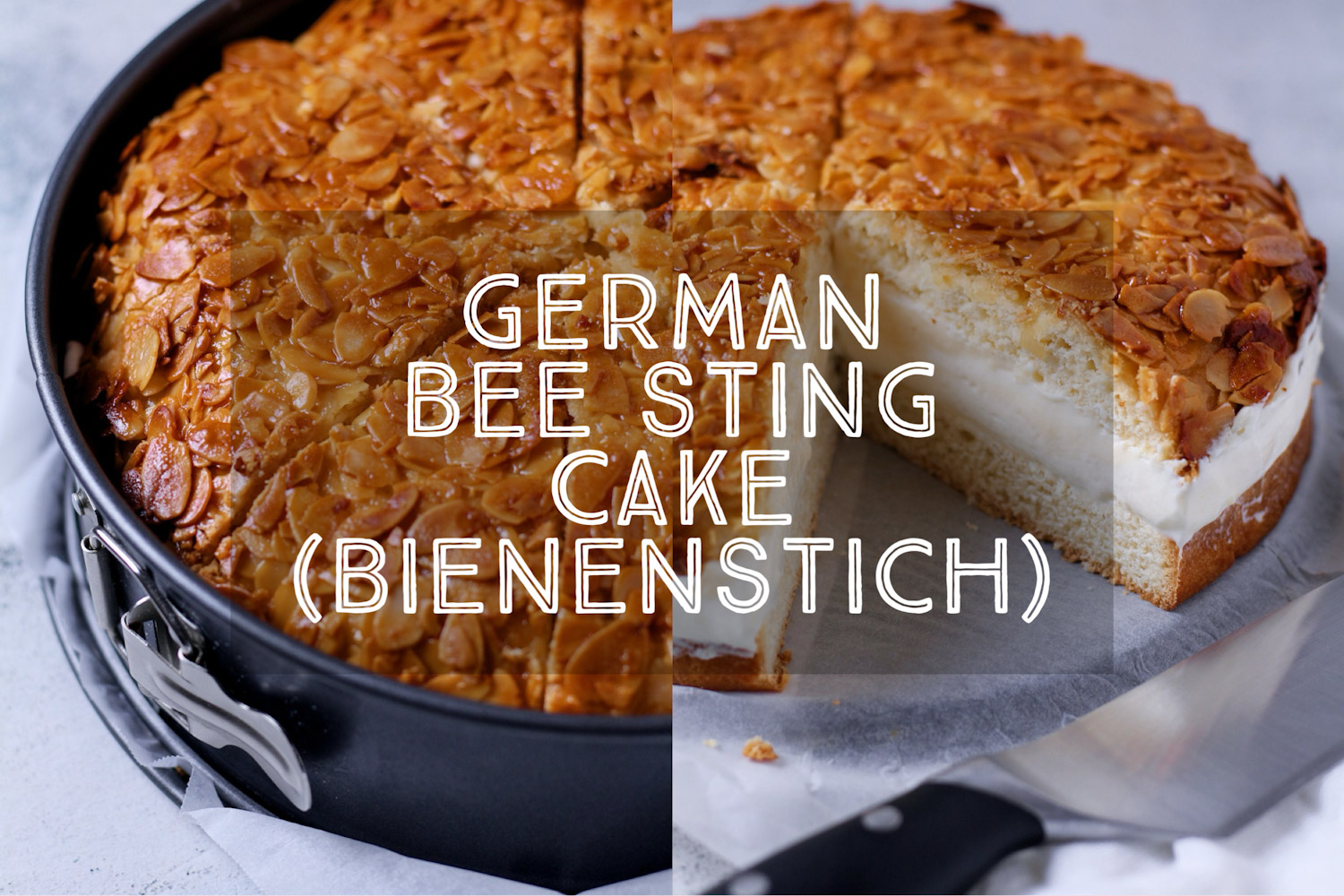
A Bienenstich Kuchen, or Bee Sting Cake, is one of Germany's most popular tea-time treats.
With thick and luscious vanilla cream sandwiched between two layers of light and sweet yeast dough, all topped with crunchy honey almonds, this classic cake is a sure-fire crowd-pleaser.
TABLE OF CONTENTS
▼
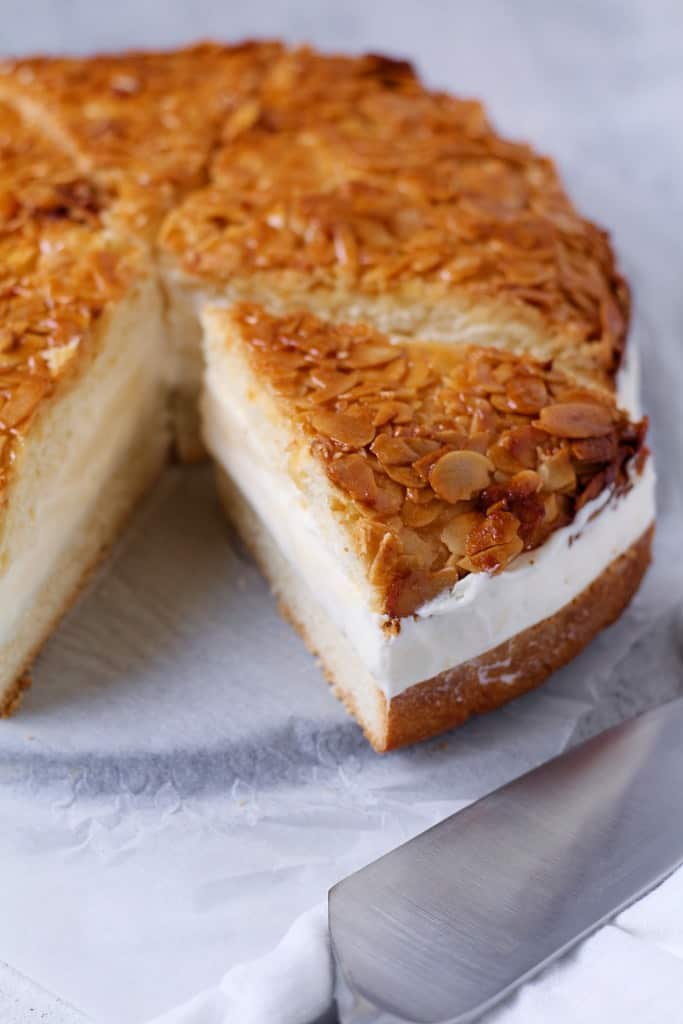
About Bienenstich Cake
Nobody can say for sure who invented Bienenstich or how it got its name.
However, the popular legend is that it was first made in celebration of two bakers from the town of Andernach who chased off an attacking army from Linz in the 15th century by throwing bees nests at them from the city walls! (Don't try this at home!)

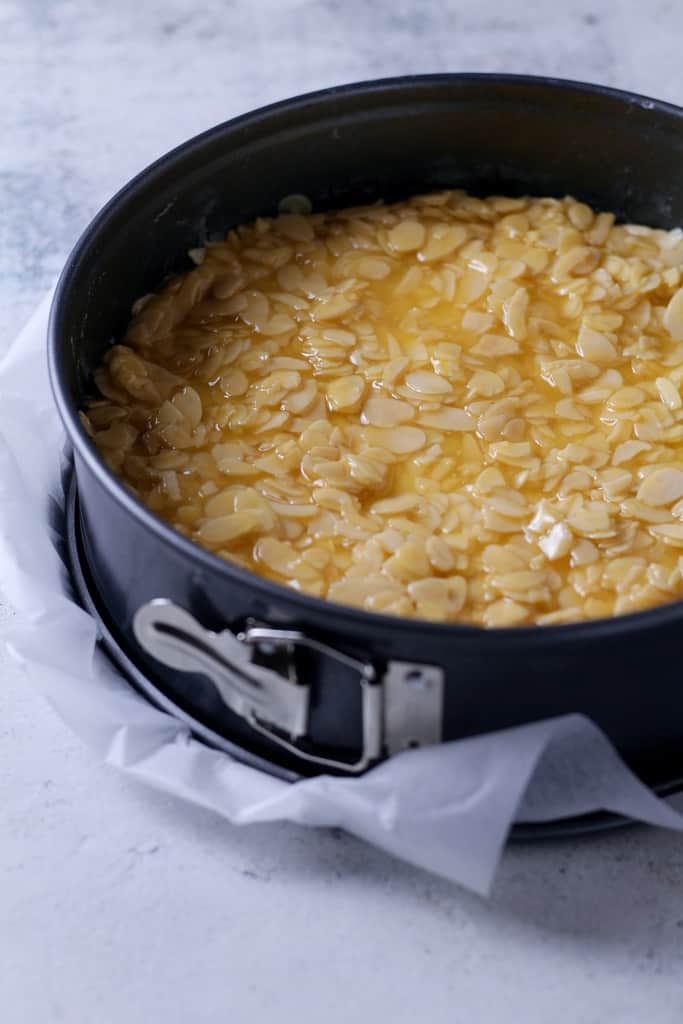
Ingredients
This delicious German cake has two main components: a brioche dough (we call that a Hefeteig), with a caramelized almond topping, and a filling of classic vanilla pastry cream.
To make my authentic German Bee Sting Cake, you'll need the following main ingredients:
- Plain or all-purpose flour and sugar: These make the base of the cake. In Germany, we usually use type 405 flour, though this is a flexible recipe, so type 550 will also work.
- Yeast: Traditionally in Germany, we bake with fresh or brewer's yeast, which gives a particularly delicious result. You'll need 21g (approximately half a cube) if using fresh yeast. This can be replaced with a 7g sachet of instant dried yeast.
- Milk and Butter: These enrich the dough to make it soft and supple. The milk is on triple duty, forming the base of the custard filling and helping to caramelise the almonds. I always use full-fat milk and unsalted butter in my baking.
- Egg yolks: Egg yolks enrich the custard and help it to set. I usually use large eggs when baking, which weigh around 63g in their shells. That is closer to a U.S.-size XL egg!
- Flaked Almonds: These form the deliciously crunchy nutty topping.
- Honey: What would a bee sting cake be without honey? I use a floral, runny honey in this cake recipe.
The complete ingredient list and recipe with detailed instructions are in the recipe card at the bottom of the page.
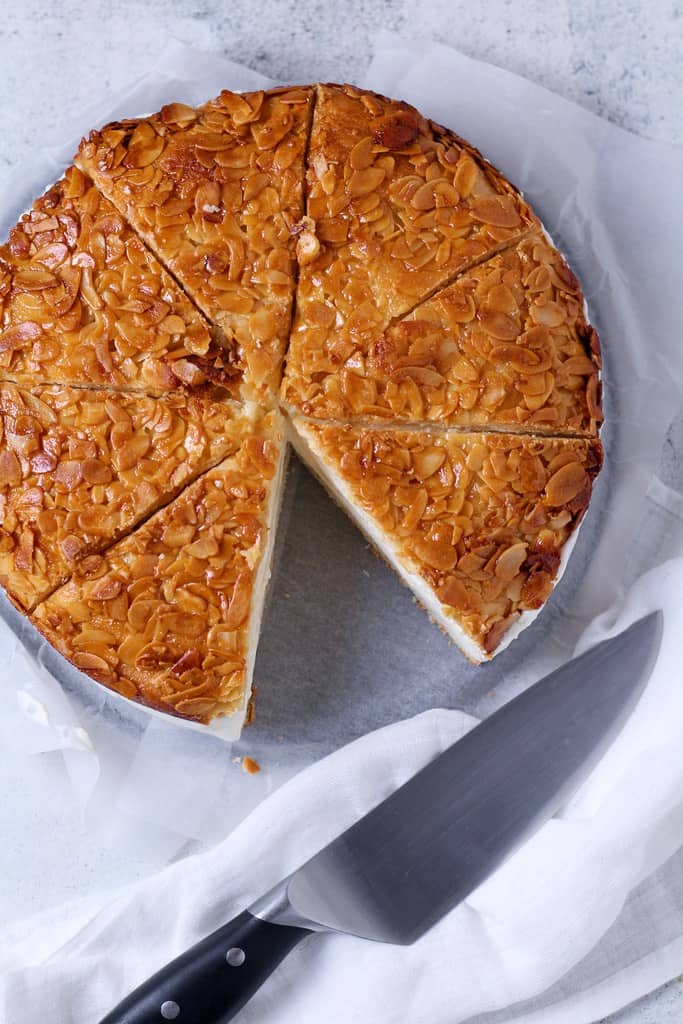
Feed a crowd
Like many traditional German cakes, Bienenstich is often made as a huge baking-tray-sized cake. I prefer to bake it in a round cake tin as you get more beautiful slices, not to mention there is only so much cake the two of us can eat (hint: quite a lot).
It's also easier to use the ring of the cake pan to hold the vanilla cream in place as it sets. You can double the recipe if you want to make a larger portion.
Is this an authentic Bienenstich recipe?
Yes! As a classic of the German kitchen, there are very few variations of Bienenstich floating around. After all, why improve on perfection?
I've lived in Germany for over a decade and have spent many years practicing and perfecting baking their delicious cakes, and this is one of my favourites.
VARIATION: In saying that, infusing the cream with a liqueur or orange blossom water could give it a lovely twist.
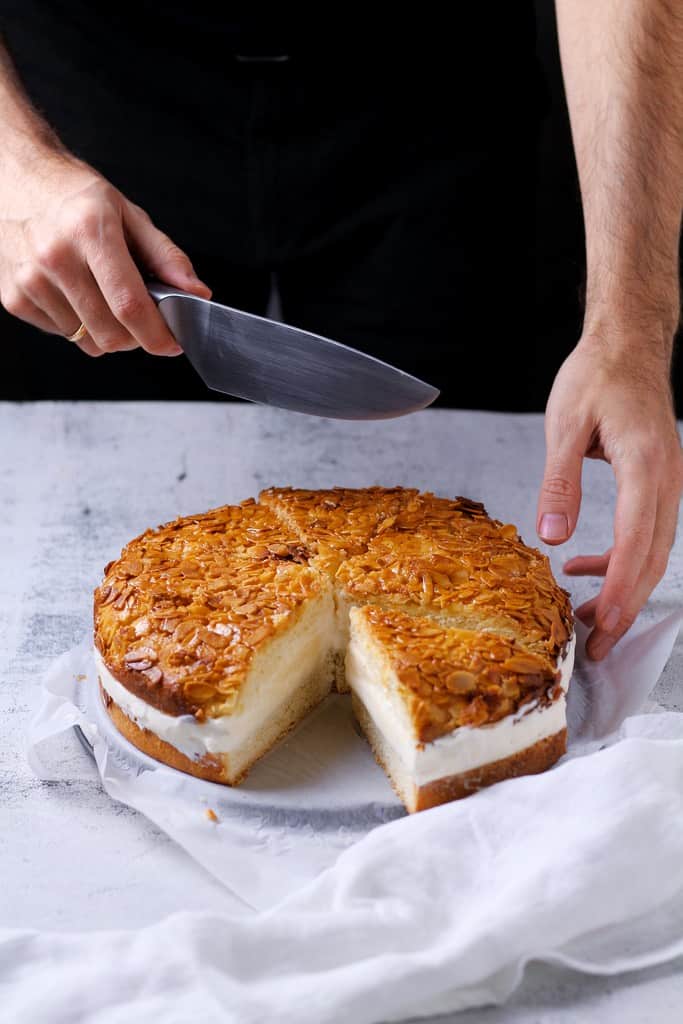
FREQUENTLY ASKED QUESTIONS
Can I make Bee Sting Cake in advance?
Yes! Up to a day or two, though it is best eaten fresh. You can make the vanilla filling 3-4 days in advance and keep it chilled in an airtight container.
I have a nut allergy! Can I still make Bienenstich?
Unfortunately not, this cake needs the almonds on top - why not try my Vanilla Custard Squares instead?
Can I freeze Bienenstich?
It is possible to freeze Bienenstich, though the texture of the filling is better when the cake is fresh. Freeze slices in an airtight container.
Looking for more Tasty German Cake recipes?
I have loads more! Click here to see some of my favourite recipes!
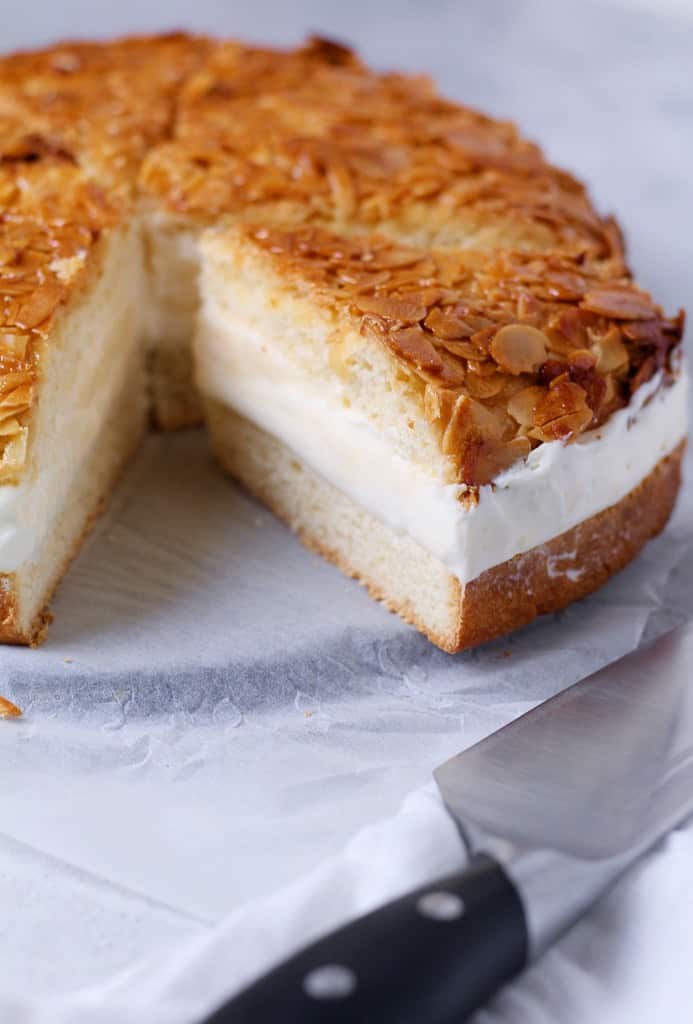
Bee Sting Cake (Bienenstich) Recipe
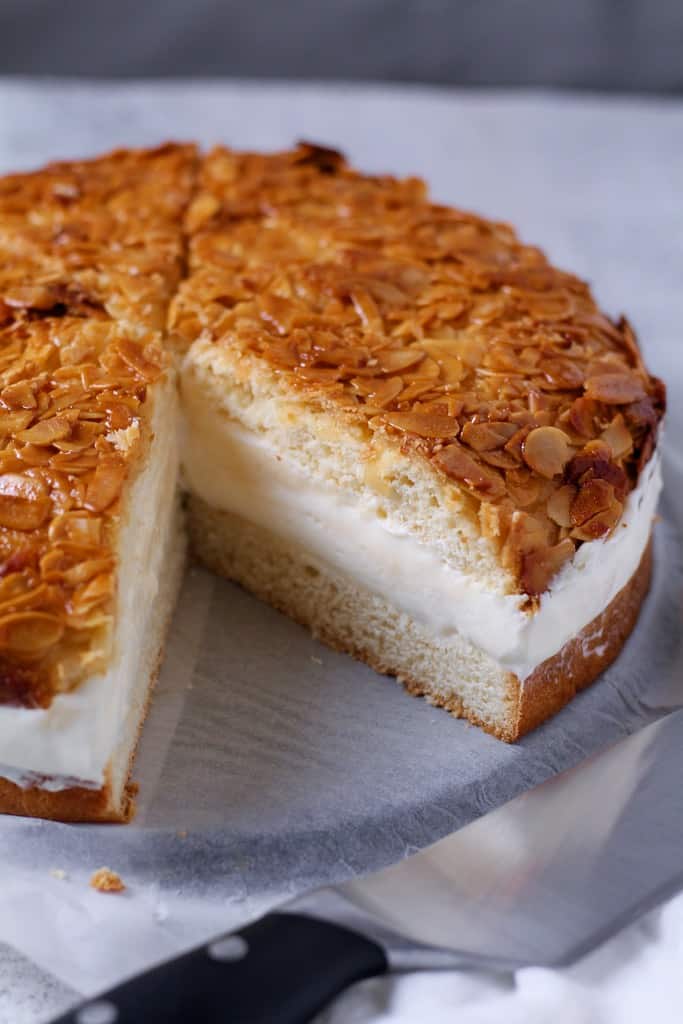
German Bee Sting Cake (Bienenstich)
Made from sweet yeast dough, vanilla custard cream and a crunchy honey almond topping - it can only be a Classic German Bienenstich or Bee Sting Cake. This most beloved of German cakes is perfect for afternoon tea and will surely have you coming back for more.
Ingredients
for the dough:
- 350 g all-purpose flour
- 50 g white sugar
- 7 g sachet instant yeast, or 21g fresh yeast
- zest of 1 lemon
- pinch of salt
- 150 ml whole milk
- 75 g unsalted butter
- 1 teaspoon vanilla extract
FOR THE FILLING:
- 400 ml full-fat milk
- 200 ml heavy cream
- 50 g unsalted butter
- 60 g cornstarch / cornflour
- 75 g white sugar
- 2 egg yolks
- 1 tablespoon vanilla extract or vanilla sugar
FOR THE HONEY-ALMOND TOPPING:
- 75 g unsalted butter
- 50 ml cream
- 50 g white sugar
- 1 tablespoon runny honey
- 100 g sliced almonds
Instructions
- HEAT MILK AND BUTTER: To make the dough, combine the flour, sugar, yeast, lemon zest and salt in the bowl of a stand mixer with the dough hook attachment fitted. Heat the milk and the butter in a small saucepan over low heat until the butter is just melted. Remove from the heat and cool for 2-3 minutes before pouring into the bowl with the other ingredients.
- KNEAD DOUGH: Knead for 5 minutes until the dough is soft and supple, then shape the dough into a ball, cover with a cling film or plastic wrap and return to the bowl. Cover with a clean tea towel and leave to rise in a warm place for 1 hour.
- MAKE FILLING: Meanwhile, make the filling by whisking 100ml of the milk with the cornstarch, sugar, egg yolks and vanilla extract in a large mixing bowl. Heat the remaining milk and cream in a saucepan over medium heat until tiny bubbles form around the pan's sides.
- COOL FILLING: Pour the milk and cornstarch mixture into the hot milk and whisk constantly until thickened, taking care not to let the mixture boil. Scrape back into the bowl, press a piece of cling film or plastic wrap directly onto the surface and set aside to cool completely at room temperature.
- HEAT OVEN AND ROLL OUT DOUGH: When the dough has risen, heat the oven to 180°C / 350°F / Gas 4. Line the base with parchment paper and grease the sides of a 26cm (10 in.) round springform pan, then roll the dough out on a lightly floured surface to 26cm in diameter and lift into the pan. Cover and allow to rise a further 15 minutes.
- PREPARE TOPPING: While the dough rises for the second time, prepare the honey-almond topping by combining the butter, cream, sugar and honey in a small saucepan. Bring to a simmer, stirring to dissolve the sugar, then simmer for 2 minutes. Stir through the almonds and remove from the heat.
- BAKE: Spread the almond mixture evenly across the dough, then bake in the preheated oven for 30 minutes until well-risen and golden brown. Allow to cool in the cake pan for 5 minutes, then loosen the cake edges with a small sharp knife and remove the side of the pan. Let the cake cool completely.
- CUT: When the dough is completely cool, use a serrated knife to cut evenly through the middle, setting aside the top layer. Place the bottom of the cake onto a serving plate and replace the ring of the cake pan around it.
- ADD FILLING: Use an electric beater to whisk the custard filling until completely smooth, then spread over the bottom layer of the cake and transfer to the fridge for at least one hour to set.
- SERVE: Meanwhile, use a sharp knife to cut the top of the cake into 8 even slices (you can even use a pizza roller here!) Place the slices on top when the cake has been in the fridge for half an hour. Serve chilled. Guten Appetit!
Notes
Imperial and cup measurements are approximate. I recommend an inexpensive digital kitchen scale like the one below for the best and most accurate results.
Recommended Equipment
As an Amazon Associate and member of other affiliate programs, I earn from qualifying purchases.
Nutrition
Serving: 1slice | Calories: 705kcal | Carbohydrates: 72g | Protein: 12g | Fat: 42g | Saturated Fat: 22g | Polyunsaturated Fat: 3g | Monounsaturated Fat: 13g | Trans Fat: 1g | Cholesterol: 146mg | Sodium: 43mg | Potassium: 299mg | Fiber: 3g | Sugar: 29g | Vitamin A: 1267IU | Vitamin C: 0.2mg | Calcium: 161mg | Iron: 3mg
Tried this recipe?I'd love to hear how it went! Please leave a review or a star rating and let me know how it was! Use the hashtag #daysofjay on Instagram so I can see your delicious creations.
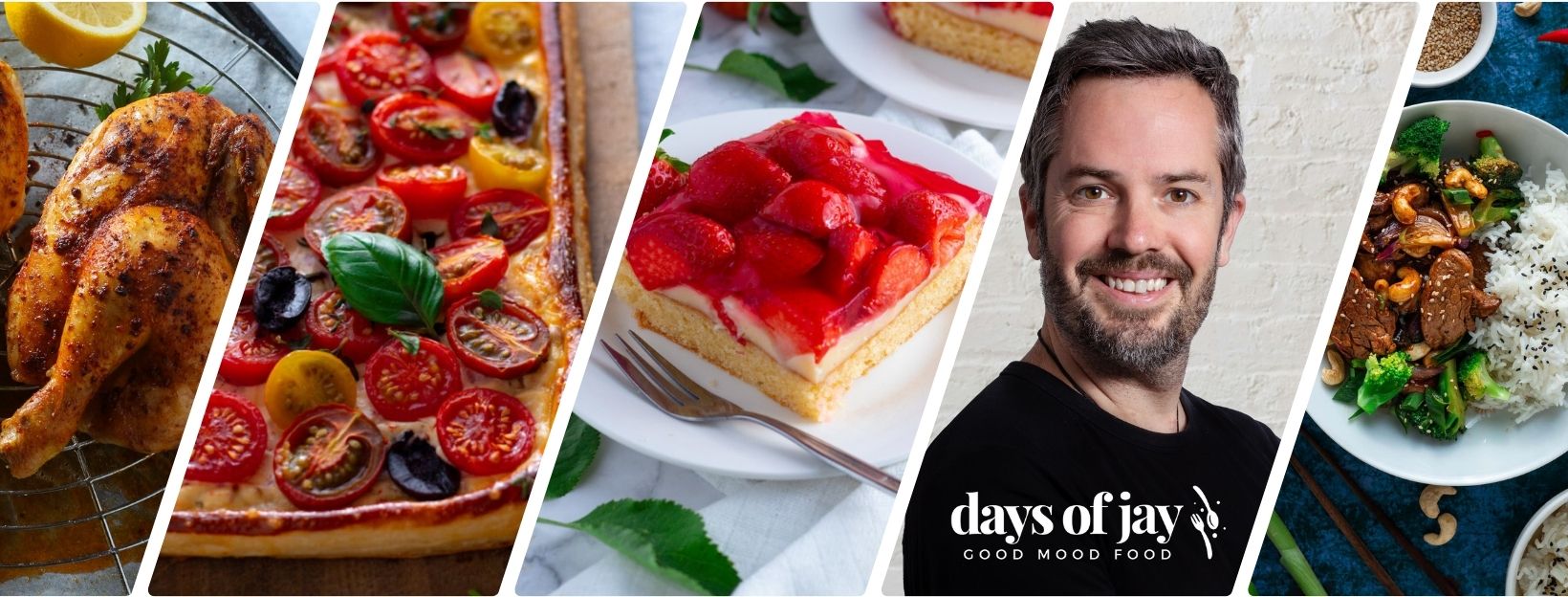

About the Author
Jay Wadams is a cookbook author, food photographer, and graduate of Le Cordon Bleu in Gastronomy and Nutrition.
Based in Italy 🇮🇹 Germany 🇩🇪 and Australia 🇦🇺.




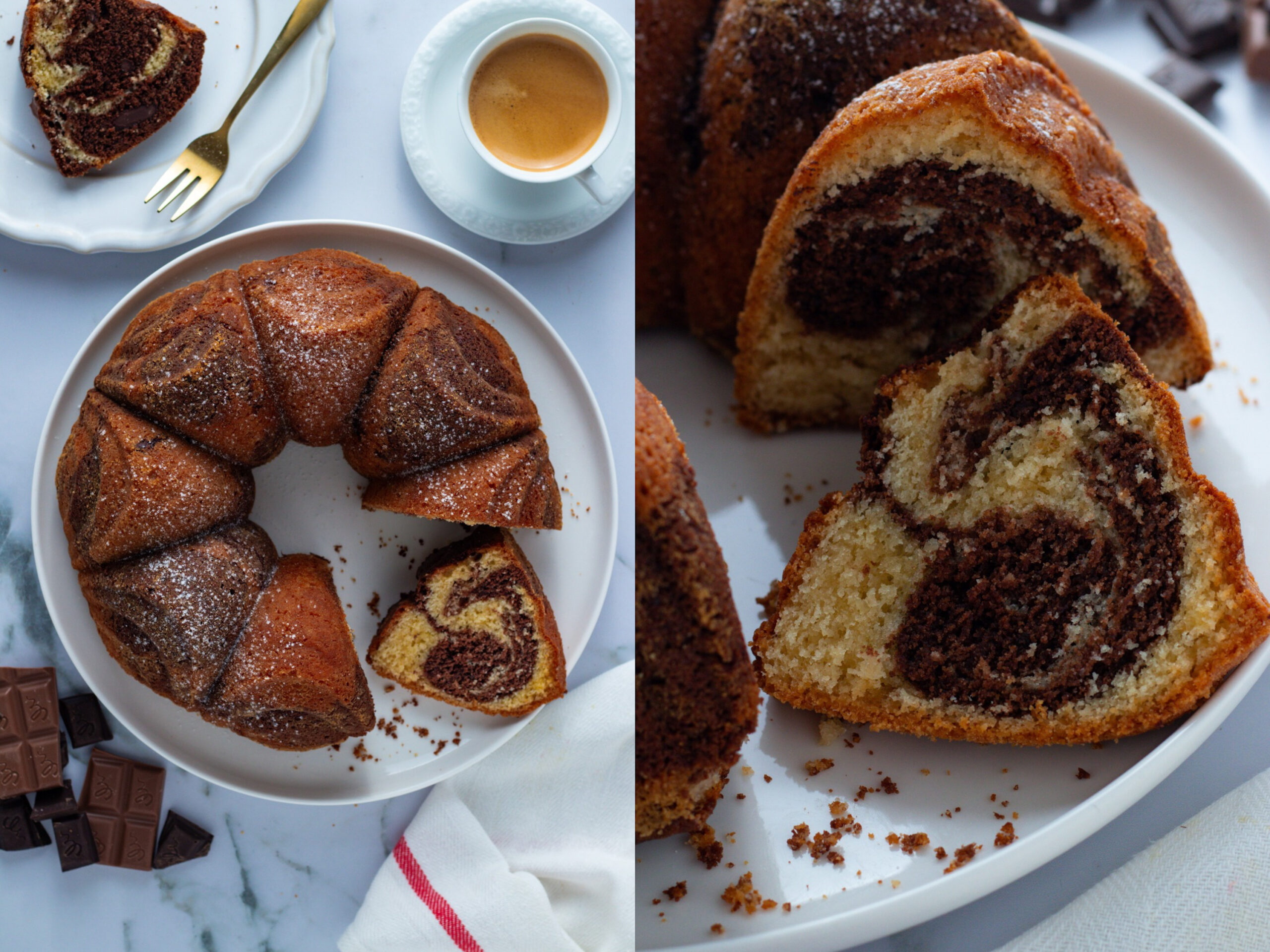
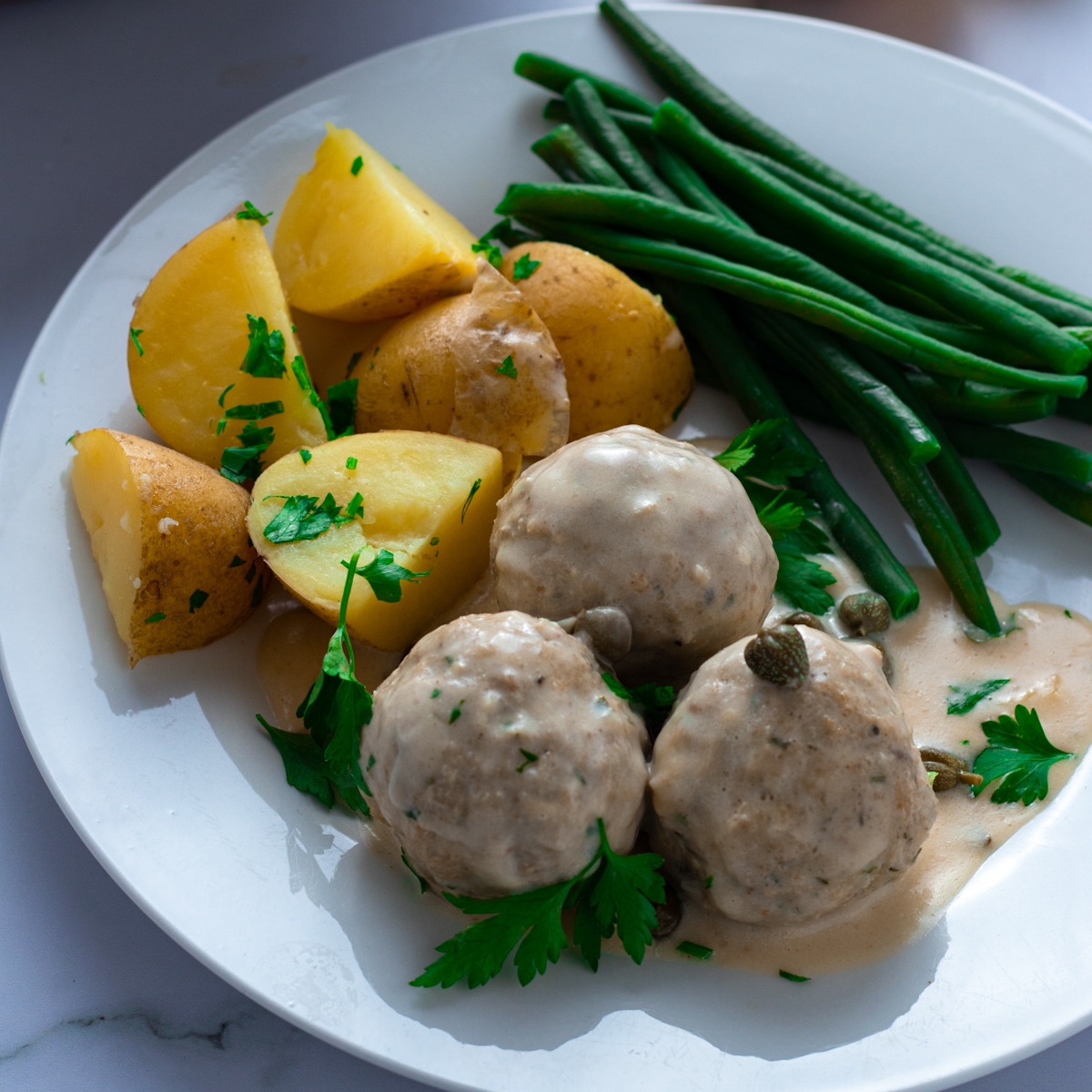
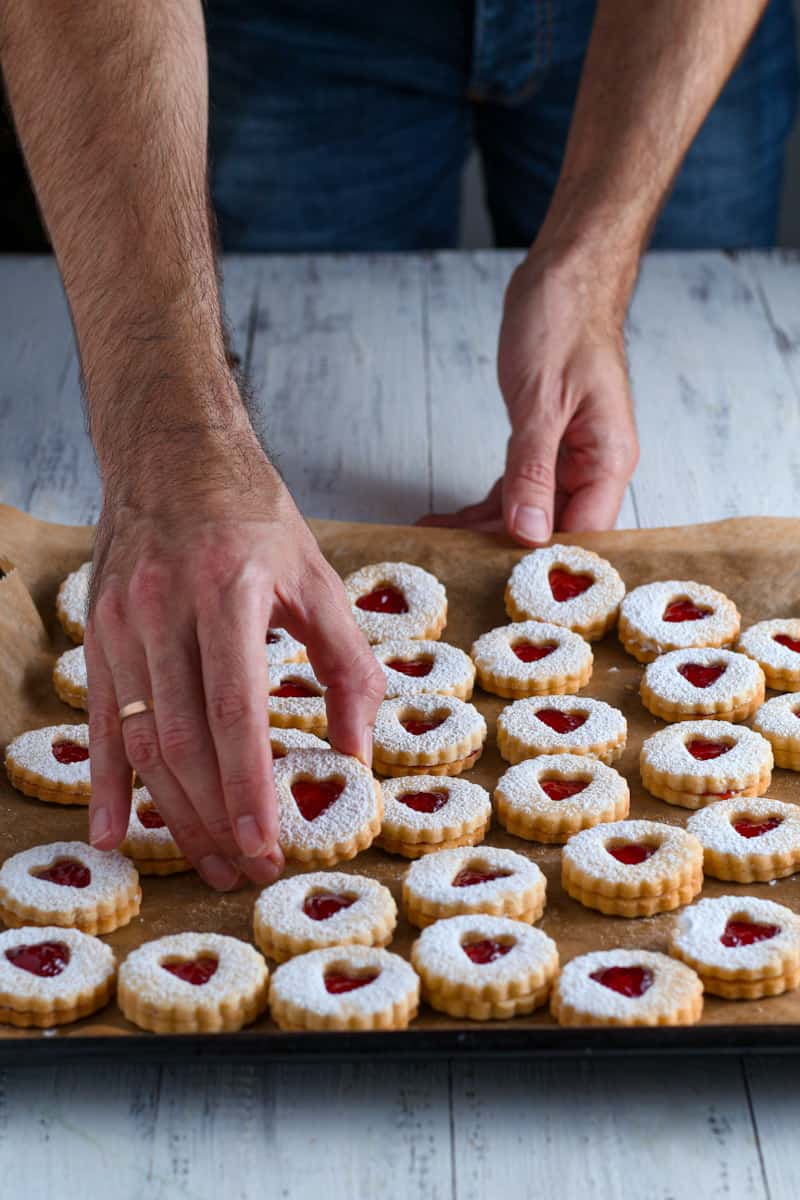
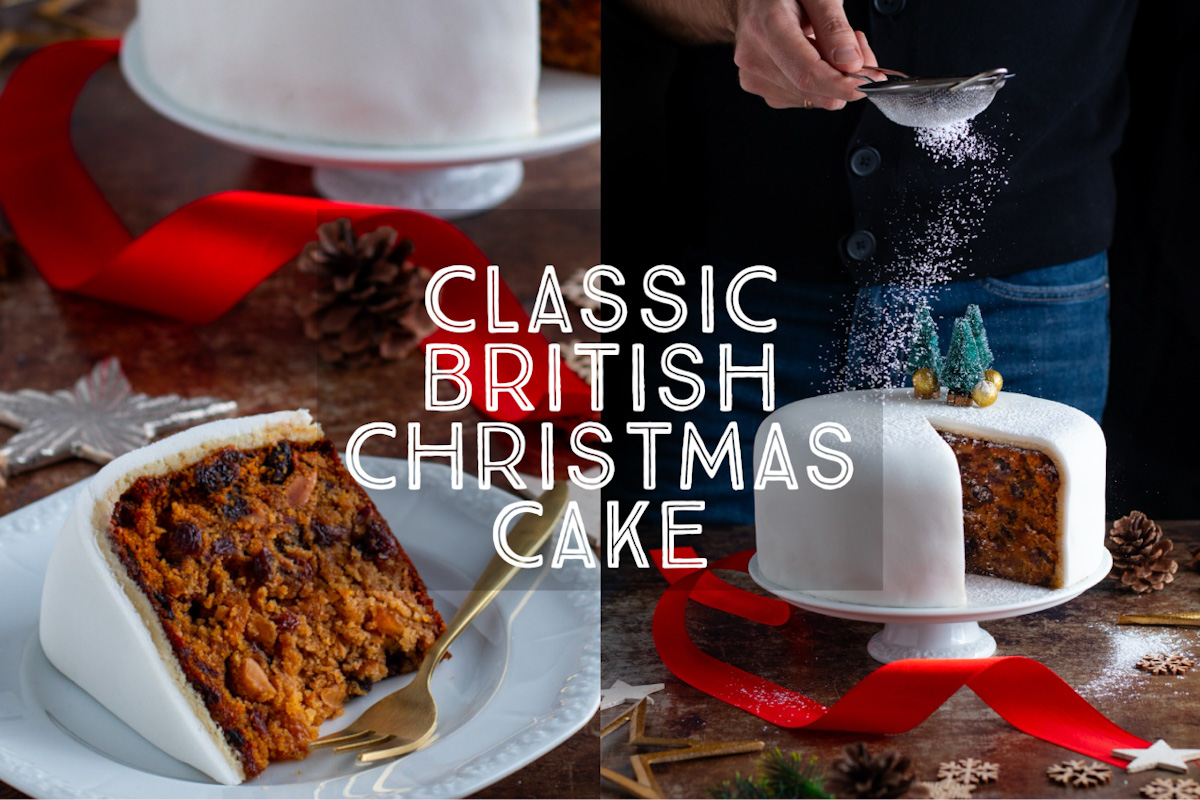
Just wondering why your filling looks white, where mine looks yellow. Followed instructions completely. Haven't had it yet as I am waiting for the cake to cool. Looks good. Hope it tastes like the ones I got in Germany. Thank you for putting this out there.
Hi Renate, your filling will be just perfect, I am quite sure. Likely it is because you had some lovely yellow egg yolks or butter - German butter is particularly pale yellow which makes things like this a bit lighter in colour. While I am writing, if you find the topping is too firm (this sometimes happens with the caramelised topping), chill the cake for a couple of hours and then bring it back to room temperature, it will soften up and be even more delicious! J.
What a great recipe. Will make it soon.
I see that the brioche dough in this recipe does not contain eggs or egg yolks. Is that correct?
Hi there! Great minds must think alike, because I am just in the process of updating this recipe to make the instructions a little clearer. In fact, I baked two fresh Bienenstich today (sooo good!) In answer to your question, this particular brioche/hefeteig doesnt need egg because the topping and filling are quite rich. However while I was experimenting today, I added egg to one batch of dough and I think I prefer it! Look out for the updated recipe in the next 24 hours 🤩 J.
Hi Jay
I saw on a reply to a comment that you had tried adding egg to your dough. The recipe has not been updated to include egg. I just made my first Bienenstich from a recipe on the internet and that dough was too soft (it contained 1 whole egg). Have you since decided that it's better without the egg after all? My recipe was a bit of a flop so I will try yours out.
2nd Question is about the lemon zest. From when I tasted Bienenstich in Germany, I don't recall any lemony flavour. Was that something that you added or is it the normal way? Can't wait to try your recipe as I want to achieve the same taste as I remember from Germany.
Hi Sandra, great questions! I have been experimenting recently with adding egg to this dough and I feel like it is better with an egg yolk added (though it’s perfectly delicious both ways!) it is in my queue to update but hasn’t been just yet as I am working on a very exciting book project (all about baking!)
Just mix the egg yolk in with the rest of the dough and you can reduce the milk by about a tablespoon if you are concerned with the dough being too soft. Regarding lemon zest, adding a little lemon zest or orange zest is very standard in a German Hefeteig like this, it is a very subtle flavour but makes it even more delicious! Very finely grated zest is best. I’d love to know how you get on! J.
Sorry, 1 more question. The instructions say to wrap the dough ball in plastic wrap then place in a bowl and cover with a towel. If it is wrapped in plastic wrap wouldn't this inhibit the dough rising?
Hi Warren, ahh I see that I could have written this more clearly so I will update the recipe! Just loosely cover the dough ball with a sheet of cling film (no need to wrap, it is just to keep a bit of moisture in). The towel over the top helps keep the dough warm while it rises. Have a great day and please let me know if you have any other questions 😀 J.
I was just curious at the difference in the amounts of the instant vs. the fresh yeast. Is the instant stronger and that's why there is less used in the recipe?
Hi Warren! Great question! Dried yeast is much more concentrated than fresh yeast, so you only need ⅓ of the amount, though it is a little slower to “wake up” than fresh! If you like Bienenstich, you will definitely enjoy Butterkuchen too. Happy Christmas, J.
Love it! Mom always made Bienenstich, Zwetchgenkuchen, Obst Boden and Schwarzwälder kuchen. Miss mom and her cooking. I'm making rouladen and Bienenstich for fathers day.
Wow Carmen, your Mom sounds like she was a wonderful baker! What lovely memories and such tasty things you are baking for Father's Day! I love Rouladen and Bienenstich too! I had a delicious Bienenstich in Munich a little while ago served with fresh raspberries on the side, it was extra tasty! J.
So excited to see this recipe. My German grandmother always made this for the holidays as I still do at 80 yrs old. Only difference we make in topping is to add coconut in the topping. Your Beef Rouladen recipe is exactly the same as ours. Here’s to family traditional recipes.
Hi Susan, what wonderful memories you must have of your grandmother’s cooking! How lovely to carry on the family tradition. I love the idea of putting coconut in a Bienenstich, it sounds delicious so I’ll try that next time. Thank you so much for taking the time to write! J. p.s rouladen are so tasty, aren’t they?
Brilliant, thanks so much. I’m right at that part now ☺️ X
Awesome!! Good luck and let me know how you get on! 🙂 J.
It’s delicious! Thanks very much ☺️
Loving this cake. Thank you for the recipe ☺️
I’m so happy you enjoy it! Bienenstich is one of the best German cakes I think. If you’re making it again, try adding a few raspberries on top of the filling before putting thr ‘lid’ on - the little pops of flavour are delicious! Thanks so much for taking the time to write and share your experience with this recipe! 🙂 J
Hello! Trying this recipe for the first time just now, in the filling section it says 50g of butter but the method for making the filling doesn’t mention butter!
Any help much appreciated,
Thank you xx
Hi Holly! Wow, thank you for catching this! You whisk in the butter right at the end after you’ve poured in the hot milk! I’ll update the recipe now. Thank you again for picking up on this in the recipe! J.
Thank you so much for BIENEN STICH recipe. I made it with gluten Free flour, amazing gluten free BIENEN STICH best ever.
I am so happy you enjoyed this recipe Sofiah! Thank you very much for your kind words! J.